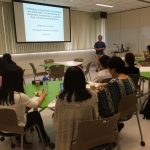Abstract
There are well-established relations from overall levels of phonological and spatial abilities to Chinese reading and mathematical competencies: people who are stronger in the former perform better on tests of the latter. However, do the rates of growth in phonological and spatial abilities also matter? This longitudinal study of Hong Kong Chinese children (aged three to six) demonstrated that growth rate in phonological awareness during the preschool years significantly predicted both Chinese reading and mathematical competencies at the end of preschool, and that growth rate in spatial perception also significantly predicted mathematical competence. These effects were over and above the overall levels of phonological awareness, spatial perception, and spatial reasoning. The findings highlight the need to provide phonological and spatial learning opportunities for preschoolers whose rates of growth in these skills are slower than those of their peers.
Speaker
Dr. Zhang Xiao
Associate Professor, Division of Chinese Language and Literature, The University of Hong Kong
About the Speaker
Dr. ZHANG Xiao is currently an Associate Professor in The Division of Chinese Language and Literature, The University of Hong Kong. His recent research is devoted to understanding children’s motivation and learning. He is particularly interested in the cognitive, motivational, and environmental factors that underlie children’s acquisition of Chinese language and mathematics. His research has used information from various sources, including longitudinal data of typically developing children, studies of children who have reading and mathematics learning disability, intervention programs for children from lower socio-economic backgrounds, and cross-cultural studies of Chinese and Western children.
Date
8 June 2016 (Wednesday), 12:45 - 02:00pm
Location
Room 203, 2nd Floor, Runme Shaw Building , HKU
Chair
Dr. Doris Law
Presentation Slide
Presentation Slide 1 :
- ‘Curses in TESOL’: Postcolonial Desires for Colonial English
- “Enhancing Data-Driven Learning in Disciplinary L2 English Contexts: Introducing CorpusMate”
- “Neither Bilingual nor Education”: critiques of bilingual education in state school education and responses to them
- A Two-Tiered Investigation Into the Dual Goal in EMI Education: Assessment and Instructional Practices
- Acculturation and digital trans-literacies in identity construction: An interdisciplinary perspective (Nov 6th, 2025)
- Appropriation of Resources by Bilingual Students for Self-regulated Learning of Science
- Auckland U – HKU Joint Webinar (28 November, 2024)
- Automated Content Feedback and Young English Learners’ Behaviours, Performances and Response
- Book Launch Seminar: Language Across the Curriculum & CLIL in English as an Additional Language (EAL) Contexts
- Critically Engaged Literacy Workshop as Decolonial and Anti-Racist Pedagogy (April 16th, 2025)
- Crosslinguistic influence in foreign and second language learners
- Developing Language Educators’ Understanding of Assessment Reform Discourse and Practices: School-University Collaborative Action Research as Praxis
- Digital literacy pedagogy:
Key issues in the age of Gen-AI
- Digital Multimodal Composing for Specific Purposes: The Case of Sustainability Discourse
- EMI Symposium 2023: Fostering Collaboration
- Exploring Self-Regulated Use of Artificial Intelligence Tools in Language Learning
- Generative AI: Implications and Applications for Education
- Global Englishes-informed Teacher Education: Present Cases and Future Directions
- HKU-NCL Joint Webinar (Nov 27th, 2025)
- HKU-Newcastle U Joint Webinar: Critical Perspectives on Language Policy and Practice (May 2nd, 2025)
- HKU-NIE Joint Webinar: Designing Learning and Assessment with Multimodality in CLIL Classrooms
- Hong Kong SAR Government’s ‘Biliteracy and Trilingualism’ Policy: Sizing Up and Meeting the Challenge
- Hong Kong Students’ Self-regulated English Writing for Academic Studies
- HUMANISING TECHNOLOGY in Language Learning & Teaching
- Interactional Reflexivity in the Age of AI: Rethinking L2 Writing Teachers’ Assessment Literacy Development (Oct 9th, 2025)
- Language ideologies in text-based art of Xu Bing: Implications for language policy and planning
- Language Learning in 3D Virtual Worlds
- Learning about and using academic vocabulary: Critical issues for pedagogy (Feb 18, 2025)
- Motivational and Empowering Feedback in the Writing Classroom
- Multilingualism and its Ramifications
- Multilingualism and Mobility: The Semiotic Production of Centres and Peripheries in Airport Spaces
- Multilingualism and the Brain
- Narrative Skills in Mandarin- English Dual Language Immersion Learners
- Narratives of Cross-Cultural Understanding among South Asian Diasporic Students in Hong Kong
- NCL-HKU Joint Webinar (June 5th, 2025)
- Newcastle U-HKU Joint Webinar on Cultural Artifact Creation (14 November, 2024)
- Oklahoma U-HKU Joint Webinar (05 December, 2024)
- Optimising Classroom Learning: Speaking in and about Mathematics Classrooms
- People who come from state education are different”: How language use maintains social exclusion in Medical Education
- Policy vs Practice: Homework in Hong Kong EFL Classrooms
- Review of recent research on AI-powered technology in second language teaching, learning and testing (Feb 10, 2025)
- Revival and Threat: Language ideologies, policy, and nationalism in Kazakhstan and Mongolia
- Secondary school students’ source use in inquiry project-based learning (PjBL): Working towards avoiding plagiarism and engaging with sources
- Sociocultural awareness of international ELT policies: The case of a US-funded program in Morocco
- Studies of Public Policy Process and Implications for Research on Education Policy
- The Challenges of Teaching Non-Chinese Speaking Children to Learn Chinese at Kindergarten Level
- The Digital Literacies Forum 2023
- The Effects of the Medium of Instruction in Physics on Achievement and Motivation to Learn
- The Historical and Linguistic Background of South and Southeast Asian Multi-ethnic Communities in Hong Kong
- The Influence of Extramural Access to Host Culture Social Media on Ethnic Minority Students’ Motivation for Language Learning
- Top desk rejection reasons and how to avoid it
- Translanguaging in Everyday Textual Performances: Implications for Literacy and Pedagogy
- Understanding Language Learning Motivation in Hong Kong
- University of Melbourne – University of Hong Kong Joint Symposium (19 November, 2024)
- Using Reading to Learn Pedagogy to Support Non-Chinese Speaking Students Learning Chinese in Hong Kong
- Videos in language classrooms: A social semiotic perspective
- What can we learn from the Hong Kong Archive of Language Learning Project?
- New technologies in literacy research:
“Measuring” embodiment through
galvanic skin response
- Publishing in top-tier applied
linguistic journals:
Perspectives of an editor�reviewer-author





